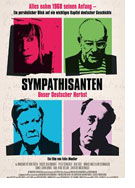

Opening 24 May 2018
Directed by:
Felix Moeller
Writing credits:
Felix Moeller
German documentarian Felix Moeller takes us back to West Germany in the 1970s, when a word guaranteed to raise partisan hackles spread through politics, media, and the public consciousness. The term “sympathizers” described not only those who supported leftist RAF terrorists with money, weapons or documents, but also artists and thinkers who criticized the state. Many public intellectuals who condemned the conditions in which RAF prisoners were kept (in isolation in the Stuttgart-Stammheim prison) were branded “intellectual enablers of terror” or “medial enablers,” and there was considerable public vitriol directed at them at the time.
Moeller, son and stepson of leading “sympathizers” of the day, filmmakers Margarethe von Trotta and Volker Schlöndorff, seems predestined for such an investigation. Forty years later, his film portrays a society on edge, combining his family history with social history to view the final product through the lens of the media then and now.
This forceful film interweaves discussions with “sympathizers,” film clips, and fascinatingly, Margarethe von Trotta’s diaries. There is testimony by some who went underground and some who served time. In a sign of how little has changed, actor-singer Marius Müller-Westernhagen tells of society’s - and the police’s - overreaction to young people who had long hair or didn’t look “middle-class.” Von Trotta and Schlöndorff describe their outrage that their supposedly democratic state was trying to settle civil complaints through police force, which they considered a remnant of dictatorship. Author Heinrich Böll’s concern was the end of the constitutional state, and that society was once again leaning right. We see historic videos of chancellors Helmut Schmidt and Willy Brandt, and of CSU leader Franz Josef Strauß calling the press guilty of aiding and abetting terrorists. There are excerpts of von Trotta’s “The Second Awakening of Christa Klages,” Schlöndorff’s “The Lost Honor of Katharina Blum,” and the omnibus film “Germany in Autumn” (1997), regarded as archetypes of “sympathetic” thinking. All reflect efforts by the New German Filmmakers to tackle challenging topics like their country’s climate of violence and denunciation.
Most of the septuagenarian interviewees continue to maintain that the RAF terrorists were treated wrongly in prison, though they don’t sympathize with their violent actions. Then as now, they contend our democratic society has too little regard for democracy, too little willingness to listen to opposition.
Under her son Felix’s not-always-gentle questioning, Margarethe von Trotta points out that repentance isn’t an option anyway: making mistakes is part of life. Her real regret is that she didn’t always think for herself, regardless of how people said she should think. (Brenda Benthien)